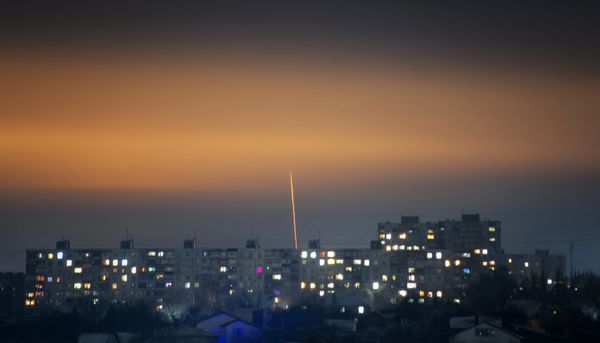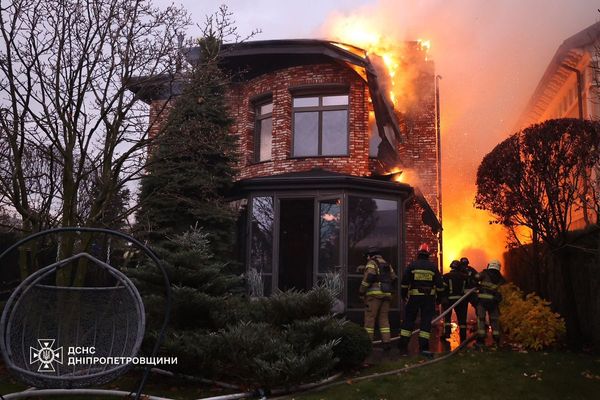
Kyiv (Ukraine) (AFP) - The United States and Britain announced new sanctions against Russia Wednesday after Ukraine said hundreds of civilians were found dead around its capital, as Kyiv warned residents in the east to get out "now" ahead of a feared assault.
The White House unveiled measures targeting Russia's top banks and two daughters of President Vladimir Putin, while Britain sanctioned two banks -- and vowed to eliminate all Russian oil and gas imports by year-end.
Their actions followed an international outcry as Ukraine said its forces found hundreds of civilians dead around Kyiv, including the town of Bucha, after the pullout of Russian troops.
"They burned families.Families.Yesterday we found again a new family: father, mother, two children.Little, little children, two.One was a little hand, you know," Ukraine President Volodymyr Zelensky said Wednesday.
In Washington, US President Joe Biden joined in describing the horrors in Bucha.
"Civilians executed in cold blood, bodies dumped into mass graves, the sense of brutality and inhumanity left for all the world to see, unapologetically," Biden said.
"There's nothing less happening than major war crimes," he added, urging the world to hold the killers accountable.
The Kremlin denies responsibility and has claimed Kyiv staged civilian deaths -- with Putin on Wednesday accusing Ukrainian authorities of "crude and cynical provocations" in Bucha.
The Russian withdrawal from areas around Kyiv and the north is part of a shift towards Ukraine's southeast, in a bid to create a land bridge between occupied Crimea and Moscow-backed separatist statelets in the Donbas region.
Ukraine Deputy Prime Minister Iryna Vereshchuk on Wednesday warned residents in the eastern Kharkiv, Lugansk and Donetsk regions to leave immediately ahead of a feared Russian attack.
"It has to be done now because later people will be under fire and face the threat of death," she wrote on Telegram.
The threat was already very real in the industrial city of Severodonetsk, the easternmost city held by Ukrainian forces, where shells and rockets were landing at regular intervals on Wednesday.
"We have nowhere to go, it's been like this for days," one of them, 38-year-old Volodymyr, told AFP standing opposite a burning building.
Elsewhere, preparations for the feared attack were hard under way, such as on a two-lane highway through the rolling eastern plains connecting Kharkiv and Donetsk.
Trench positions were being dug, and the road was littered with anti-tank obstacles.Nearby water reservoirs had been opened and bridges were being destroyed, all in an effort to slow any Russian advance.
"We're waiting for them!" said a lieutenant tasked with reinforcing the positions, giving a thumbs up.
'Leaving forever'
Thousands of people have been killed and more than 11 million displaced since Russia invaded Ukraine on February 24.
In Bucha, where Ukrainian officials blame Russian forces for carrying out a "massacre," residents were desperate to know the fate of their loved ones.
But Tetiana Ustymenko knows the conclusion to her story.Her son and his two friends were gunned down in the street, and she buried them in the garden of the family home.
"How can I live now?" she said.
Meanwhile efforts to evacuate civilians continued Wednesday, with a Red Cross convoy arriving in the southern city of Zaporzhzhia.
It was carrying hundreds of evacuees from Russian-occupied areas, but had failed to reach the besieged port of Mariupol.
One of the evacuees, Iryna Nikolaienko, told how she had been able to make her way out of Mariupol during a pause in the fighting.
"The Mariupol that I knew and loved, it does not exist anymore," she said.
"I understood that I was leaving forever."
EU 'indecisiveness'
Western powers have already pummelled Russia with debilitating economic sanctions, which forced Moscow on Wednesday to make foreign debt payments on dollar-denominated bonds in rubles, raising the prospect of a potential default.
Washington's new sanctions targeted Maria Vorontsova and Katerina Tikhonova, two adult daughters of Putin, plus the wife and daughter of Foreign Minister Sergei Lavrov and members of Russia's Security Council.
The White House also declared "full blocking" sanctions on Russia's largest public and private financial institutions, Sberbank and Alfa Bank, and said all new US investment in Russia was now prohibited.
Britain meanwhile froze the overseas assets of both Sberbank and Credit Bank of Moscow.
The EU is also poised to implement a fifth round of sanctions cutting off Russian coal imports -- and European Council chief Charles Michel said that "sooner or later", it must also impose oil and gas sanctions.
And rich countries will tap an additional 120 million barrels of oil from emergency reserves in a bid to calm crude prices that have soared following the invasion.
But addressing the Irish parliament Wednesday, Ukraine's Zelensky condemned the "indecisiveness" of European nations dependent on Russian energy.
In other moves to isolate Moscow, the US and Britain have pressed to have Russia excluded from the UN Human Rights Council, with a vote in the General Assembly scheduled for Thursday.
But US Secretary of State Antony Blinken admitted there was little anyone could do about Russia's position on the UN Security Council, where it has a veto.
"There's a pretty fundamental problem there," he said, a day after Zelensky called for Russia to be expelled from the council.
'Unbelievable' morale
Peace talks between the sides have so far gone nowhere.
Moscow says it is "ready" to continue -- however NATO chief Jens Stoltenberg said there was no sign Putin had dropped "his ambition to control the whole of Ukraine".
Spirits are high yet in Kyiv, however, said American veteran Steven Straub, who has been training with the national guard in the capital.
Straub, 73, fought during the Vietnam war, and said Ukraine was "much different."
"What surprised me here is the morale...It's unbelievable," he told AFP.
burs-st/mlm







